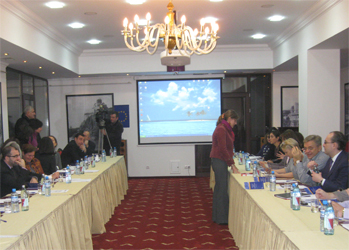At the Round table Georgian NGO representatives informed diplomats and international organization about the situation of human rights defenders in Georgia as well as discussed the effective mechanisms for the protection of human rights defenders.
“It’s important that this meeting is not only for meeting but to have some reaction from internationals towards our government in order to stop terror and harassment of human rights defenders”- said Nana Kakabadze, the head of the Former Political Prisoners for Human Rights.
During the meeting, the representative of the European Commission Eva Pastrana-Gutierrez presented the EU Guidelines on Human Rights Defenders. It was said that the Guidelines provide for interventions by the Union for human rights defenders at risk and suggest practical means to support and assist human rights defenders. An important element of the Guidelines is support for the Special Procedures of the UN Commission on Human Rights, including the UN Special Representative on Human Rights Defenders and appropriate regional mechanisms to protect human rights defenders.
During the Round Table the Human Rights Centre disseminated the statement according which NGOs in Georgia strongly condemn the smear campaign against human rights defenders in the country. The statement lists the cases of harassment of civil activists and says that Human Rights Defenders “are particularly concerned by the fact that those media and political figures used sensitive topics such as the Russia-Georgia war, ethno-territorial conflicts, minorities etc., to manipulate the public and mislead them in respect of human rights defenders and their work. In particular, during December 2009 media outlets, widely considered to be state-controlled or otherwise having close ties with the government, consecutively released one-sided and biased reports portraying human rights defenders as enemies and traitors of the nation working against the interests of the society. This was followed by critical statements against defenders made by political figures currently in power.”
The representative of the EC delegation Franois Massoulie: “It’s important to have an effective mechanism to defend the human rights defenders. Human rights defenders are the cornerstone of human rights policy. If the defenders of human rights are themselves victims of abuse, pressure, harassment, this is a very clear indicator that something is wrong in the context they trying to operate. in this sense, this meeting was very timely. It was a good opportunity for the representatives of the international community – embassy of the EU countries, of the US, UN and others including the CoE which is playing a very important role to meet with the actual representatives of the human rights organizations. They got the chance to tell us about the problems they could face and of course we listen to them very carefully and I could tell them that the information they provide us with is going to be checked, double checked, because we could act only on very strong facts. It’s not about emotions, it’s not about policy statements, it’s not about political affiliations, but it’s about facts. If we see that there are some cases where administration of justice or rule of law is in doubt, then of course we act as we are worn by our own EU guidelines – to get in tough with the authorities of the country and try to raise the issues and try to address them. We also conduct a very important substantial dialogue with the Georgian authorities. Last year, 2009, we had two sessions of human rights dialogue in Tbilisi for the fist part and in Brussels for the second one, where we raised all range of issues including the issues of human rights defenders. in the context of this human rights dialogue, we have specific consultations with NGOs, with civil society, with human rights organizations. Because it is not only human rights and human rights defenders but it’s also the role of civil society in a democratic country which is very strongly promoted and encouraged by the European Union.”





